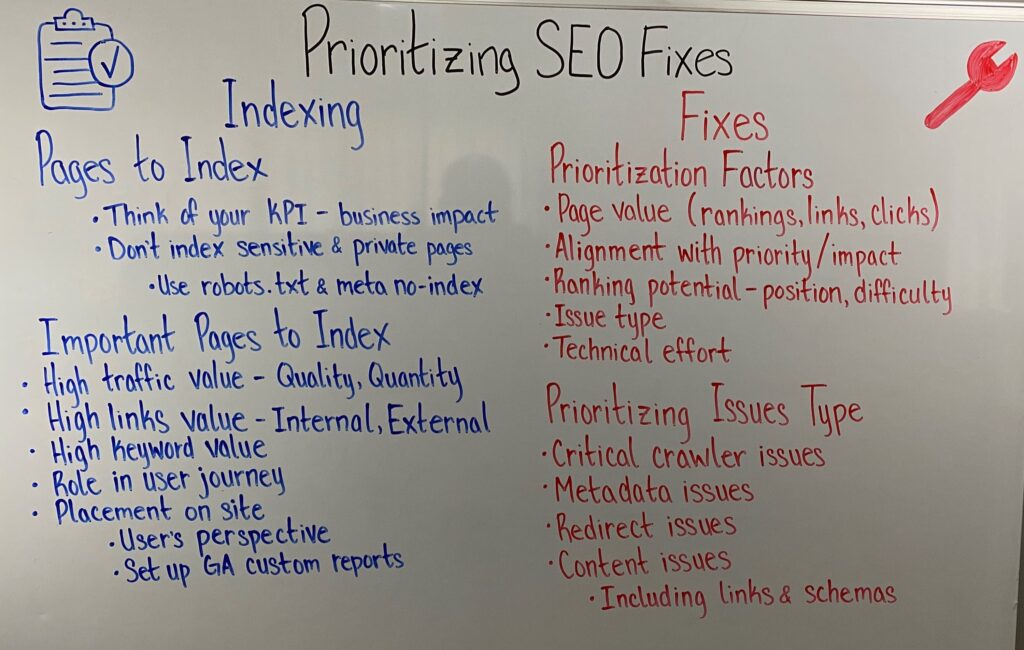There is no real difference between technical SEO and on page SEO. They are both equally important in terms of optimizing a website for search engines. Technical SEO deals with the behind-the-scenes aspects of a website, such as the code and structure, while on page SEO focuses on the content and keywords of a website.
Both need to be taken into consideration when trying to improve search engine rankings.
There are a lot of different opinions out there about which is more important for SEO, technical SEO or on page SEO. And the truth is, both are equally important. Here’s a look at the difference between the two and why they’re both essential for ranking well in search engines.
Technical SEO refers to all the behind-the-scenes optimization that goes into making a website search engine friendly. This includes things like ensuring your site is properly coded, using the right keywords and tags, and having a sitemap that can be easily crawled by search bots. Technical SEO also includes speed optimization and making sure your site is mobile friendly, since more and more people are using mobile devices to access the web.
On page SEO is all about optimizing your website’s content for the search engines. This means using keyword-rich titles and descriptions, as well as creating quality content that provides value to users and helps answer their queries. In addition to great content, on page SEO also involves optimizing your website’s design and layout so that it’s easy to navigate and looks good on all devices.
Both technical SEO and on page SEO are important for getting your website ranked high in search engines. So if you want to ensure that your site is visible to potential customers, make sure you’re doing both!
What is On Page SEO Off Page SEO and Technical SEO Tutorial in Hindi (2022) | Techno Vedant
What is a Technical Seo?
A technical SEO is an individual who specializes in the promotion of websites through the implementation of search engine optimization (SEO) techniques. The main goal of a technical SEO is to improve the visibility and ranking of a website in search engine results pages (SERPs).
One way to think of a technical SEO is as a webmaster who understands how search engines work and how to optimize websites for better indexing and ranking.
A technical SEO often works closely with web developers and other IT professionals to ensure that a website meets all the necessary requirements for optimal indexing and ranking.
The most important thing for a technical SEO to remember is that their ultimate goal is to improve the visibility and ranking of their client’s website. In order to do this, they must have a good understanding of how search engines work and what factors they use to rank websites.
Additionally, they should stay up-to-date on all the latest changes in the algorithms used by major search engines so that they can make sure their clients’ websites are always compliant.
What is the Difference between Technical And Content Seo?
When it comes to SEO, there are two main types: technical SEO and content SEO. Both are important in their own way and play a vital role in getting your website to rank higher in search engine results pages (SERPs). So, what’s the difference between the two?
Technical SEO is all about making sure your website is set up in a way that makes it easy for search engines to find and index your content. This includes things like optimizing your website’s structure, using the right tags and keywords, and creating an XML sitemap.
Content SEO, on the other hand, is all about creating high-quality, keyword-rich content that will help your website rank higher in SERPs.
This includes things like writing blog posts, creating infographics, and adding images and videos to your website.
Both technical and content SEO are important for getting your website to rank higher in SERPs. However, if you want to achieve long-term success with SEO, you need to focus on both aspects equally.
What are the 3 Types of Seo?
When it comes to SEO, there are three main types: on-page SEO, off-page SEO, and technical SEO. Each type is important in its own way and should be given attention accordingly. Let’s take a closer look at each one.
On-page SEO has to do with the content and structure of your website’s pages. This includes things like optimizing title tags, meta descriptions, header tags, and images. It also involves making sure your website’s content is keyword-rich and informative.
The goal of on-page SEO is to make your website as search engine friendly as possible so that it can rank higher in the search results pages (SERPs).
Off-page SEO refers to all the activities that you do outside of your website to promote it. This includes things like link building, social media marketing, and directory submissions.
The goal of off-page SEO is to create high-quality backlinks that point back to your website which will help improve its authority and rankings over time.
Technical SEO encompasses all the behind-the-scenes aspects of optimizing a website for search engines. This includes things like site speed optimization, setting up Google Search Console, creating an XML sitemap, etc.
Technical SEO can be a bit more complex than on-page or off page optimization but it’s still important in order to ensure that your website is accessible and easy for search engines to crawl and index properly.
All three types of SEO are important if you want your website to rank well in the search results pages. However, they each require different strategies and tactics in order to be effective so it’s important to focus on one type at a time rather than trying to tackle everything at once.
What are the 4 Types of Seo?
SEO is the process of optimizing a website for Google search with the goal of earning higher web traffic levels and improving the visibility of the site.
There are four main types of SEO: on-page SEO, off-page SEO, technical SEO, and local SEO.
On-page SEO refers to optimization strategies that are applied directly to the website itself in order to improve its ranking in Google search.
This includes things like optimizing title tags and meta descriptions, as well as creating keyword-rich content.
Off-page SEO, on the other hand, refers to strategies that are used to promote the website externally in order to earn backlinks and improve its authority. This can be done through things like guest blogging or social media outreach.
Technical SEO encompasses all of the behind-the-scenes optimization that needs to be done in order for a website to be visible and crawlable by Google. This includes things like setting up proper redirects and fixing broken links.
Finally, local SEO is a specialized form of optimization that is focused on promoting businesses within a certain geographical area.
This can be done through things like claiming listings on local directories and optimizing Google My Business profiles.

Credit: play-media.org
Technical Seo Vs Seo
Technical SEO and SEO are two terms that are often used interchangeably, but they actually refer to two different aspects of search engine optimization. Technical SEO is all about making your website as easy for search engines to crawl and index as possible. This includes things like optimizing your site’s code, structure, and navigation.
On the other hand, SEO is about creating content that is relevant and keyword-rich so that it will rank highly in search engine results pages (SERPs).
Both technical SEO and regular old SEO are important for getting your website to rank well in search engines. However, if you want to really succeed at search engine optimization, you need to focus on both aspects equally.
On-Page Seo Vs Off-Page Seo
On-Page SEO: The Basics
On-page SEO (also known as on-site SEO) is the practice of optimizing a website to improve its organic search engine rankings. On-page SEO involves improving the content and structure of a website to make it more accessible and relevant to search engines.
It also includes optimizing the website’s code and architecture to ensure that it can be easily crawled and indexed by search engine spiders.
Off-Page SEO: The Basics
Off-page SEO (also known as off-site SEO) is the practice of optimizing a website to improve its organic search engine rankings.
Off-page SEO involves building links from other websites back to your own, as well as optimizing your social media presence and creating compelling content that encourages people to link to your site. It also includes making sure that your website’s code and architecture are optimized for search engines so that they can easily crawl and index your site.
On-Page, Off-Page Technical Seo
Search Engine Optimization (SEO) is a process of optimizing a website to rank higher in search engine results. SEO can be divided into two main categories: on-page SEO and off-page SEO.
On-page SEO focuses on optimizing the content and structure of a website to make it more relevant and accessible to search engines.
This includes things like choosing the right keywords, improving site architecture, and creating compelling content.
Off-page SEO focuses on building links from other websites back to your own. This helps improve your website’s authority and relevance, both of which are important ranking factors.
Things like guest blogging, directory listings, and social media can all help with off-page SEO.
Technical SEO is a subset of on-page SEO that deals with the more technical aspects of a website. This includes things like site speed, indexation, crawlability, and mobile optimization.
Technical SEO is often overlooked but it’s important for making sure your website is accessible and visible to search engines.
Both on-page and off-page SEO are important for getting your website to rank higher in search engine results. If you’re not sure where to start, focus on creating compelling content and building high-quality backlinks.
Conclusion
There are many factors to consider when optimizing a website for search engines. The most common distinction is between on-page and off-page optimization. On-page optimization refers to all of the measures that can be taken directly within the website in order to improve its position in the search engine results pages (SERP).
This includes things like choosing the right keywords, creating informative and keyword rich titles and descriptions, optimizing your website’s code and structure, and improving the overall user experience. Off-page optimization, on the other hand, refers to all of the activities that you can do outside of your website to help improve its visibility and ranking. This includes things like link building, social media engagement, and creating compelling content that others will want to share.
Both on-page and off-page SEO are important for getting your website to rank higher in the SERPs. However, which one is more important depends on a number of factors, including your industry/niche, competition level, and current ranking. In general though, it’s advisable to focus more on on-page optimization if you’re just starting out with SEO or if your website is in need of some major improvements in this area.
Once you’ve made some progress with on-page optimization, then you can start turning your attention more towards off-page SEO activities.



